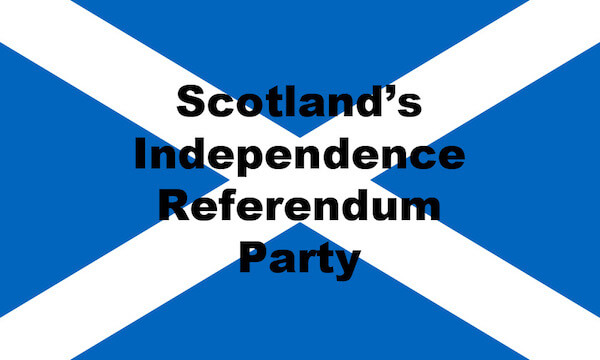Commenting today on the British general election result, and the following statement from the Electoral Reform Society, Mark R Whittet, Leader of Scotland’s Independence Referendum Party, said:
“There is now a Coalition of EVEL (English Votes for English Laws) haunting the outcome of this Anglo-Scottish election.
“Because of EVEL – rushed through in a fit of pique by the last Tory prime minister after the SNP tsunami with 56 seats in the 2015 election – none of the newly-elected British Unionist MPs in Labour, Tory or Liberal parties in Scottish seats will be able to vote on English health or education or domestic matters.
“And – because they’re in the wrong (British) parliament at Westminster – they can’t reverse the Scottish Parliament vote in favour of holding another Scottish Independence Referendum.
“But the bigger – and even more horrible – picture from this British parliament election is that it has painted even more clearly how unfair, un-representative and, frankly, un-democratic the rotten ‘first past the post’ UK voting system is.
“It is uniformly unfair to smaller parties -such as Scotland’s Independence Referendum Party – and also to the larger parties, such as Labour; with almost exactly the same 40% share of the popular vote, the Tories got 319 Westminster seats while the Labour party got only 261 seats – 18% fewer than they would get under a proportional voting system.
“The real lesson for Scotland from this rotten English system is that the Scottish Parliament must be responsible for its own voting system – and that also means that the Tories must respect the ‘triple mandate’ in favour of holding a new Scottish Independence Referendum at a time when we choose.
“This is why Scotland’s Independence Referendum Party aims to stand in the next Holyrood general election – to provide pro-Independence voters a second chance to vote in favour of Scottish Independence and to even up the odds against the three-in-one British Unionist parties.
“And this is also why Scotland’s Independence Referendum Party again calls on SNP leader Nicola Sturgeon to work together with us in a progressive alliance in the next Holyrood general election to even up the score.”
Electoral Reform Society
8 Jun 2017
 Scotland’s multi-party system can never be represented by First Past the Post
Scotland’s multi-party system can never be represented by First Past the Post
At the close of the polls on Thursday, people in Scotland will have faced 10 opportunities to vote in the last eight years.
Of these elections and referendums, the general election is the only completely non-proportional vote, using First Past The Post to decide who we send to Westminster.
Where Scottish democracy has moved forward and matured in recent years, developing a multi-party system and one of the most trusted governments in the democratic world, UK general elections represent a step back, likely to be far from representative of the Scottish electorate’s interests.
The Independence Referendum of 2014 saw a democratic surge across Scotland. The constitutional question ignited debates and shared learning in recently abandoned town halls across the country. More people than ever before were reading news, politics increased in popularity among young people, and people who had never been activists campaigned and organised their local communities. This grassroots participation led to the biggest collective political learning experience in living memory.
Meanwhile, the elections for office in Scotland have encouraged a multi-party and plural system. The Scottish Parliament has representatives from five parties, elected with the semi-proportional Additional Member System.
Council elections use the Single Transferable Vote, which has seen an increase in independent candidates standing for office, increasing opportunities for everyone to find representation.
These elections build the trust of Scottish voters, encouraging them that their decisions at the ballot box in the Scottish Parliament and Council elections count, whether they vote Green, Lib Dem, Conservative, Labour, SNP, or Independent.
The democratic upskilling of citizens and the building of trust in our electoral systems mean growing a more nuanced political culture, where the bounds of the debate need not simply contain the two biggest parties. And this means a more robust democracy for everyone. The blunt tool of FPTP in the General Election, however, is on track to undermine and threaten this.
With a winner takes all system, the complexities of the increasingly sophisticated multi-party system of Scotland will not be represented.
It is possible, for example, that Scottish Labour will come second in the polls overall in Scotland, but third in seats.
It is also possible that the SNP will retain their majority, but with a much thinner margin and many more wasted votes.
This inequality in democratic firepower is borne out in polling, where tactical voting has increased.
Taking a step back from the forward momentum of building a stronger democracy in Scotland, the General Election will be at best alienating to a huge proportion of voters, and at worst, a democratic catastrophe.
